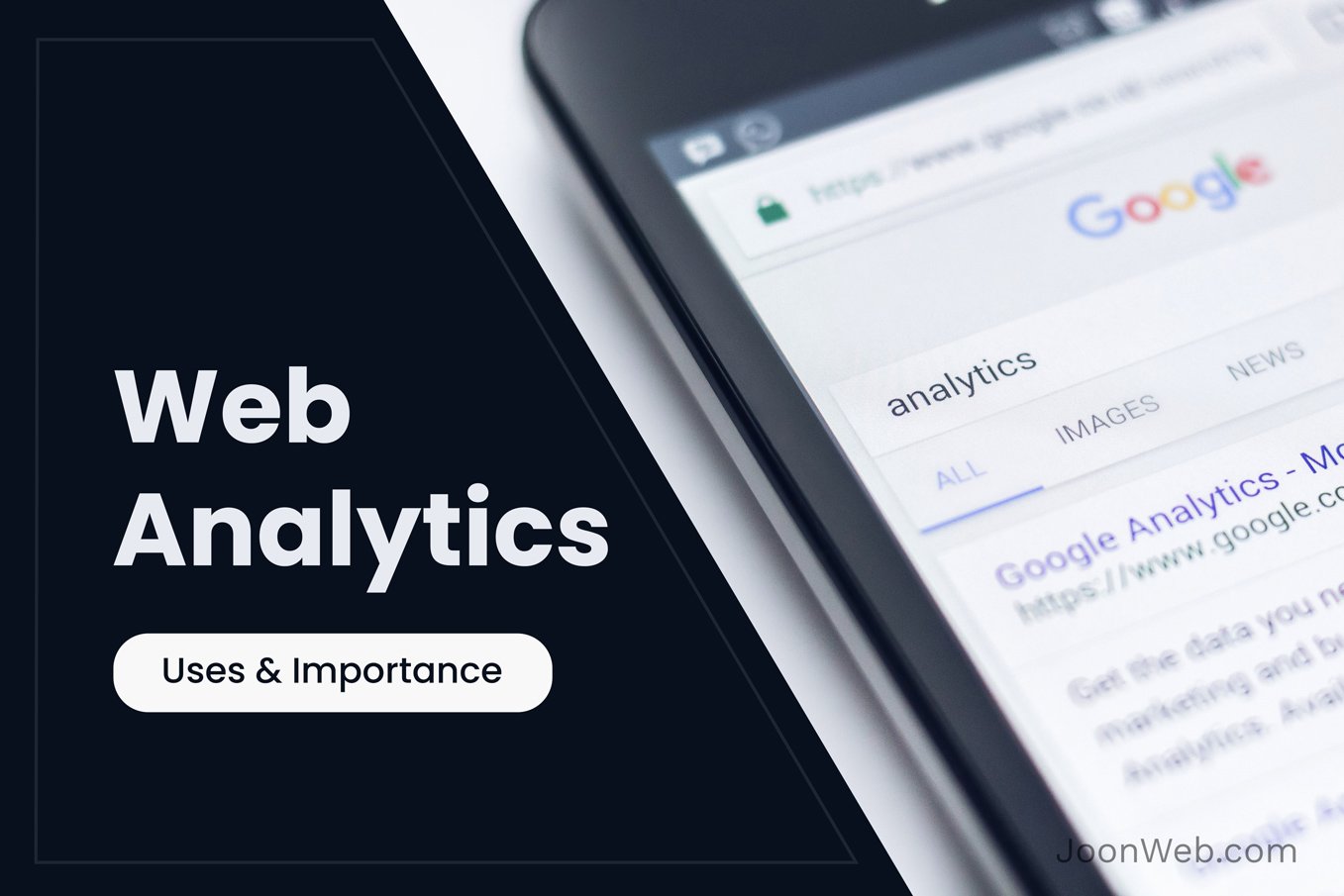Web analytics is the collection, processing, and evaluation of data from websites. We could utilize Web analytics to see how effective our marketing campaigns were, detect and solve problems in our online services, and build customer profiles to boost the profitability of our advertising and sales efforts. The ability to interpret and use data offered by consumers, rivals, and partners is critical to every successful organization.
Importance of Web Analytics?
It's an old cliché in business that anything worth doing is worth measuring. Website analytics provide information and statistics that may be utilized to improve the website's user experience. Understanding consumer behavior is also essential for improving important conversion metrics on a website.
Web analytics, for example, will show you the most popular pages on your website as well as the most frequent purchase channels. You can also utilize website analytics to track the effectiveness of your internet marketing activities and use that data to guide future efforts.
What Is The Purpose Of Web Analytics?
The majority of analytics solutions 'tag' their web pages by including a piece of JavaScript in the page's code. The analytics program uses this tag to track each time a visitor or a link is clicked on the page. Other information collected by the tag includes a device, browser, and geographic location (via IP address).
Cookies may also be used by web analytics services to track individual sessions and identify repeat visits from the same browser. Because some users erase cookies and browsers have varied restrictions on code snippets, no analytics platform can guarantee that their data is completely accurate, and different tools can sometimes offer slightly different results.
Examples of Web Analytics
Google Analytics is the most widely used web analytics tool, but there are several others on the market that provide specific information such as real-time activity or heat mapping. Apart from this, Adobe Analytics is a powerful analytics tool that can be customized to fit your needs (Adobe bought analytics leader Omniture in 2009). In addition to this, there are other analytics tools such as Kissmetrics, Mixpanel, Parse.ly, CrazyEgg & more.
Top 10 Uses Of Web Analytics That Will Enhance Your Website
1. Helps In Measuring Website Traffic
Web analytics can tell you a lot about how much traffic is coming in. At any given time, the number of users and visits to your website. What's the source of these things? On the webpage, what are they doing? What is the average amount of time they spend on the site?
All traffic sources and website conversions will be divided in a clear and understandable manner by the analytics. A corporation can determine which activities provide the most profit by analyzing the data presented.
The data will help a company invest its time and money more effectively by tracking how organic and sponsored traffic has evolved over time in real time.
2. Identifying and Capitalizing on the Right Target Audience
Finding the correct target audience for your products and services is critical in marketing. Marketing initiatives will be more profitable and make a positive impression on the firm if the target group is accurate. Companies will be able to use web analytics to build and discover the correct target audiences.
Companies will be able to generate marketing materials that leave a positive impression on their customers if they can identify their target demographic. The correct marketing efforts targeted at the right audiences will boost sales, conversions, and the overall performance of a website.
3. Monitoring the Bounce Rate
In analytics, a person who visits a website but does not interact with it is known as a bounce rate.
A high bounce rate could indicate:
- Users didn't think the information was for them, or it didn't match the search query well enough.
- Overall, a poor user experience.
When a website has a high bounce rate, it's difficult to expect it to generate quality leads, sales, or any other type of business conversion. Lowering the bounce rate and increasing the profitability of the website may be done by tracking and enhancing the user experience and ensuring that the content is what the users want. Using analytics to track distinct exit pages will reveal the business's worst-performing pages.
4. Marketing Campaign Optimization and Tracking
Unique and particular links that can be traced can be established for various marketing campaigns, whether online or offline. Tracking these unique links will give you information on how these marketing campaigns were received by users and whether or not they were lucrative.
You can uncover possibly high-returning campaigns to invest more in and delete campaigns that are performing poorly by tracking everything feasible. With Google Campaign URL Builder, you can quickly create unique links.
Tracking offline-to-online initiatives are also possible with unique links. For instance, a company could distribute its unique link at an event or use it in mailing efforts, with the results being recorded online.
5. Conversion Rate Optimization (CRO)
Websites can only enhance their conversion optimizations by utilizing web analytics. The purpose of CRO is to get people to complete tasks that have been allocated to them. When the number of objectives received is divided by the number of users, the conversion rate is computed.
A website should track a variety of conversions, and each organization should track the ones that are most important to them. Some of the conversions include:
- Leads
- Every stage of a sales funnel is important (add to carts, purchases, product views, etc.)
- Subscribers to the newsletter
- Registrations
- Views on Video
- Downloads of brochures
- Text links are clicked.
- Social media shares
- Contacts are obtained through the use of contact forms.
By using web analytics to boost conversion rates, a firm can increase the profitability and return on investment of its website. Conversion optimization should always be considered, especially when increasing visitor numbers isn't enough.
6. Helps In Improving & Optimizing Your Website
A corporation can use web analytics to identify possible issues with its website and services. A flawed and confusing sales funnel, for example, on an online store, may result in fewer sales and reduced revenue. When visitors come to the site, they must find the right material at the right time.
It may also be helpful to create various landing pages for different purposes. Monitoring the performance of mobile versions is an example of how to improve the user experience.
7. Boost The Effectiveness Of Google Ads & Facebook Ads
When it comes to handling online marketing, analytics plays a crucial part. The data shows how many clicks, conversions, and how advertising was received by the target audience via online advertisements. Discovering the most prevalent Google Advertisements blunders, for example, using data can dramatically enhance your results and raise the efficiency of your ads. Effective data collection will boost the effectiveness of online ads. Remarketing in adverts is possible thanks to web analytics.
8. Online Tracking Of Business Goals
A successful firm and its website must have a clear set of objectives. Companies can set specific targets to track using web analytics. Measuring goals allows you to react more quickly to particular occurrences by using data. It's just as crucial to know what goals each given organization should track as it is to set them.
Because not all online objectives are created equal, keeping track of too many goals can become a problem for a company. Always keep track of objectives that assess the effectiveness, profitability, and flaws of specific events.
9. Helps In the Creation Of Innovative Concepts & Ideas
Data analysis provides a one-of-a-kind opportunity to discover new insights within your business model. Tracking your data will give you additional information about your company's trends and consumer experiences. These prospects could serve as seeds for internal and organic growth.
For instance, consider a recently published article that generates more organic traffic than the rest of the site. Knowing this from the start could help you steer your marketing efforts in a more productive direction.
10. Getting Started Is Simple
For the vast majority of businesses and websites, Google analytics will suffice. Google Analytics is a free web analytics tool that is easy to set up on any platform. Google Analytics will provide you with a fast snapshot of how your internet business is doing.
Apart from the above-mentioned uses, Web Analytics can be used for many other purposes as well. This will depend on the type of website/business, goals of the company & much more. In order to understand the role of web analytics in forming an effective content strategy, you can read an in-depth article at JoonWeb.






